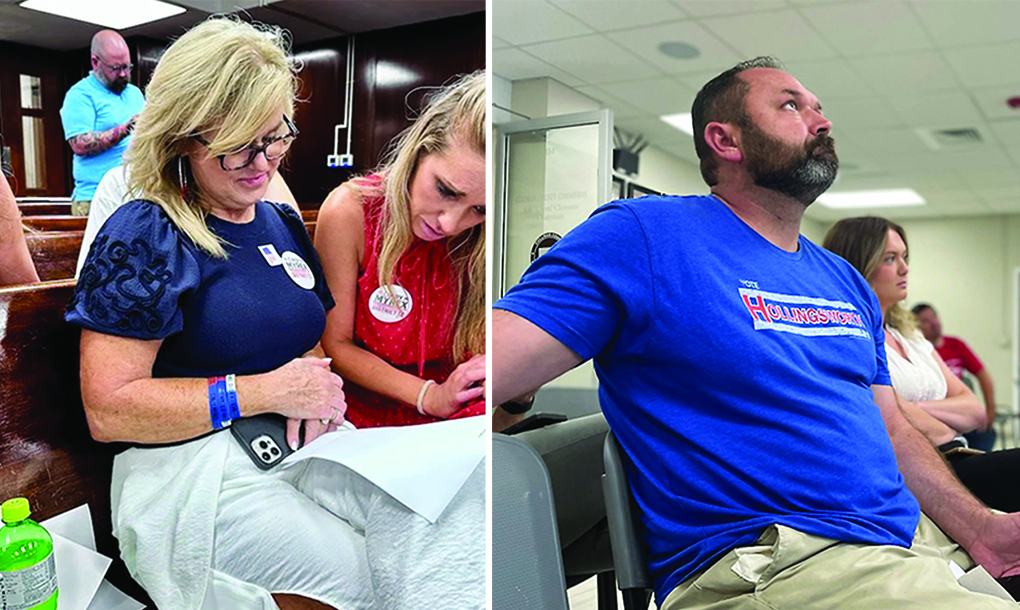Different factors can cause dizziness
Published 2:00 pm Wednesday, January 7, 2009
Health Watch By Sherry Mullenix
The North Jefferson News
Everyone at some time or another has experienced a feeling of unsteadiness or a whirling sensation in their head.
When asked what is wrong, you just might have told someone, “I’m dizzy.”
Dizziness, while being a common complaint, can mean a lot of things to different people. It’s a common complaint with sometimes serious medical complications. There are really four conditions that people describe as dizziness:
• Vertigo: A feeling of motion when there is no motion, such as you spinning or your environment spinning. Remember as a child when you spun around and around rapidly? That’s self induced vertigo, but when it happens in your normal life, it’s a sign of a disturbance in the ears vestibular system, which tells your body its orientation. About half of all dizziness complaints are really vertigo. Vertigo is best described as a feeling of movement, when no movement is occurring.
• Lightheadedness: Also know as “syncope,” it’s the feeling your about to faint.
• Disequilibrium: This is identified as a problem walking. People with disequilibrium feel unsteady on their feet and feel like they are about to fall.
• Anxiety: People who are scared, worried, depressed or afraid of open spaces may use “dizzy” to mean lightheaded, depressed or anxious.
Dizziness can be a one-time event or it can be a chronic, long lasting problem.
Nearly everyone who gets dizzy will get better because the sense of balance is a complex interaction between the brain, the ear’s vestibular system and the sense of vision. When one of these components breaks, down the others have a tendency to compensate.
Vertigo
Vertigo occurs when there is a conflict between the signals sent to your brain from various balance and sensory input from your body don’t match. Your brain processes all the different sensory inputs to maintain your sense of balance and orientation to your surroundings.
Other common causes of vertigo include inner ear problems such as some disease or simple sinus or head congestion. Other common causes include injuries to the head or ear, migraine headaches, a decrease in blood pressure and in some more serious conditions such as brain tumors or strokes.
Immediate medical attention is needed if vertigo occurs with a loss of function. Vertigo that occurs with a loss of function in one portion of the body, for example the movement of a leg or hand, can mean a problem in the brain such as a stroke or transient ischemic attack (TIA).
Alcohol and many medications included over-the-counter medications can cause lightheadedness or vertigo. These problems develop from:
• Taking too much medication (overmedicating)
• Alcohol and medication interaction
• Misusing or abusing alcohol or medications
• Drug intoxication or withdrawal symptoms from chronic drug or alcohol abuse
Lightheadedness
It’s common to feel lightheaded from time to time, and is usually not caused by a serious problem. The most common cause is a temporary drop in blood pressure, associated with a decrease of blood flow to your head that occurs when you stand up too quickly or rise from a laying position too quickly. Other causes for lightheadedness may include:
• Allergies
• Illnesses such as flu or colds
• Vomiting, diarrhea, fevers or other conditions that can cause dehydration
• Very deep and rapid breathing
• Anxiety and stress
• Tobacco, alcohol or drug use
A more serious cause of lightheadedness is bleeding. In most cases the location of the bleeding and need to seek medical attention are obvious.
If lightheadedness is prolonged with other nonspecific symptoms, medical attention is advised. An uncommon cause of lightheadedness is an abnormal heart rhythm, which causes fainting spells. Unexplained fainting spells should be evaluated by a medical professional.
Disequilibrium
This can be caused by:
• A kind of arthritis in the neck called cervical spondylosis, which puts pressure on the spinal cord
• Parkinson’s disease or related disorder that cause a person to stoop forward
• Disorders involving a part of the brain called the cerebellum, the part of the brain responsible for balance and coordination
• Diseases such as diabetes that cause a loss of sensation in the legs
Although dizziness can occur in people of all ages, it is most common among older adults. A fear of dizziness can cause older adults to limit their physical and social activities due to a fear of falling.
Be sure to discuss with your physician any recurrent or prolonged episode of dizziness.
Sherry Mullenix (J.D., R.N.) co-owns The Pharmacy in Mount Olive with her husband, Steve Mullenix (R.Ph). They can be reached at 631-1201.






